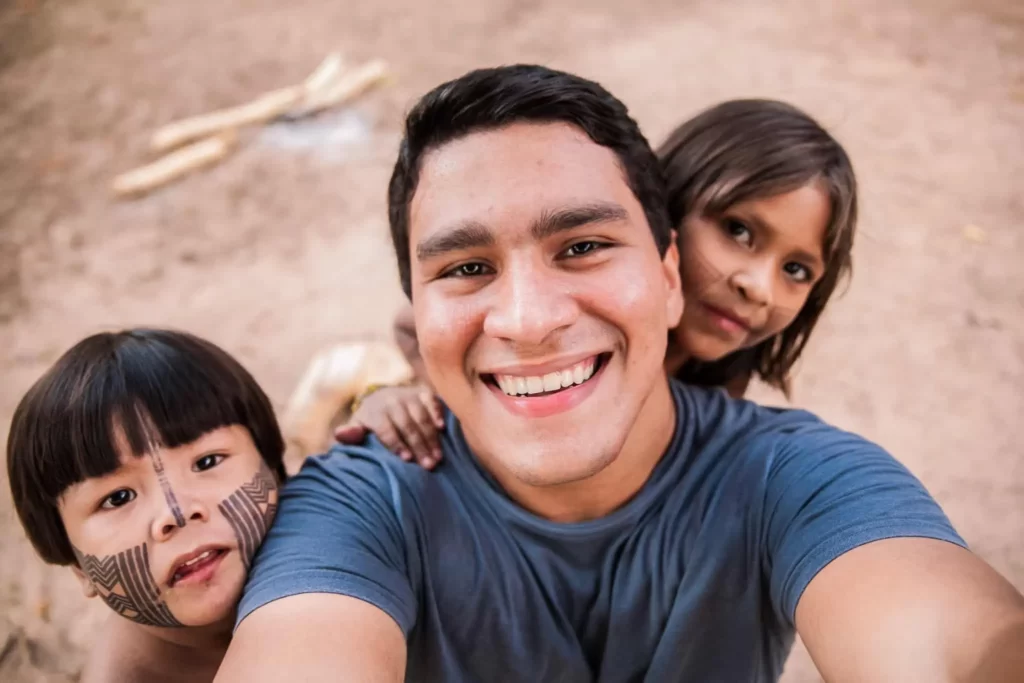| This post may contain affiliate links. Whenever you book or buy something through one of these, Giving Getaway gets a small commission, of which 100% will be donated to charity, without any extra cost to you! |
Child begging is a pervasive issue in many countries, and it can be a heartbreaking sight for many. The sight of a small, frail child begging for money on the streets can tug at the heartstrings of even the most hardened individuals. However, giving money to child beggars may not be the solution that many people think it is.
It can perpetuate a cycle of exploitation and harm that can lead to long-term negative consequences. It is essential to think before you give and consider the potential harm that may result from giving money to child beggars.
The act of giving money to child beggars may seem like a kind and charitable gesture, but it is important to understand the underlying issues that contribute to the problem. These children may be forced into begging, bought or stolen, and may be disabled or have a history of abuse.
Therefore, it is crucial to explore alternatives to giving money and support organizations that aim to address the root causes of the problem. Let’s start by understanding what exactly the problem is with giving money to child beggars.
Understanding the Issue
Child begging is an issue that is unfortunately all too common in many countries and regions around the world. In some of the poorest parts of the world, it is not uncommon to see young children on the streets asking for money or food. It is a heartbreaking sight that can elicit an emotional response from even the most stoic of individuals.
While it may appear that giving money to child beggars is a kind and charitable act, it is important to understand the underlying causes of child begging and the potential harm it can have on these children. The root causes of child begging are often complex and systemic. They involve poverty, lack of access to education, and social exclusion. Giving money to child beggars may temporarily solve their immediate needs, but it fails to address the systemic issues that perpetuate the problem.
In many cases, children are forced into begging by their families, or worse, they are bought or stolen and forced into begging by organized groups, and disabled children may be subjected to amputations to increase their earning potential. The children are then often exposed to hazardous working conditions, denied an education, and trapped in poverty with limited opportunities for escape.
When we see children begging, it makes us feel sad and want to help. But we need to think carefully before doing anything and remember that there are bigger consequences to our actions than just giving them money, so let us now look at the consequences of doing so.
The Consequences of Giving Money to Child Beggars
The act of giving money to child beggars may appear to be a kind and benevolent gesture, but it is important to recognize the potential consequences of such an action. Giving money to child beggars can have long-term negative effects on the lives of these children and can perpetuate a cycle of exploitation and harm.
For instance, giving money to child beggars can make begging a lucrative business for the children and their families. In some cases, parents may see begging as a more profitable option than working, thus encouraging their children to stay out of school and remain in the cycle of begging.
As mentioned before, organized begging networks often take advantage of this situation by buying or stealing children and forcing them into begging. These children may be disabled or have a history of abuse and are vulnerable to exploitation and mistreatment.
All this can have a detrimental effect on the children’s physical and mental well-being. They may be exposed to dangerous and unsanitary environments and be subject to abuse and neglect from the begging networks. Additionally, children who are forced to beg may experience feelings of shame and guilt and may become anxious or depressed.
In many cases, giving money to child beggars discourages them from pursuing education or alternative opportunities. Even if these children are not being exploited by organized begging networks, they may still be deprived of the opportunity to gain an education and develop their skills, thus limiting their potential for a better future.
It is essential to consider the potential consequences of giving money to child beggars. Rather than contributing to the problem, it is important to explore alternative solutions and support organizations that aim to address the issue’s root causes.
Alternative Ways to Help
Instead of giving money directly to child beggars, there are alternative methods of assistance that can have a more meaningful and lasting impact on their lives. By redirecting our efforts towards long-term solutions, we can contribute to breaking the cycle of poverty and addressing the root causes of child begging. Here are some practical steps we can take to make a positive difference:
Supporting Organizations
One effective way to help is by supporting reputable organizations that actively work to combat child begging and its underlying causes. These organizations focus on a comprehensive approach that includes rescue operations, rehabilitation programs, and advocacy for children’s rights. By donating to or volunteering with these organizations, we can contribute to their efforts in providing shelter, education, healthcare, and psychosocial support to child victims of begging.
Education, Healthcare, and Social Programs
Investing in education, healthcare, and social programs is crucial in breaking the cycle of poverty and reducing the prevalence of child begging. By supporting initiatives that prioritize access to quality education for all children or maybe even by teaching them ourselves, we enable them to acquire the skills and knowledge necessary to build a better future.
Similarly, aiming for improved healthcare services ensures that children have access to essential medical care, promoting their well-being and overall development. Supporting social programs that address the root causes of poverty, such as vocational training and income-generating activities for parents, can help create sustainable livelihoods and reduce the need for child begging.
Engaging with Local Communities
To truly make a difference, it is important to engage with local communities directly. This can involve volunteering your time and skills to organizations working on the ground, engaging in community development projects, or supporting initiatives that empower families and communities to create solutions.
By actively participating in local efforts, we can contribute to sustainable change and address the complex social, economic, and cultural factors that perpetuate child begging. However, it is important to thoroughly research and look for organizations and volunteering programs that aim to make a difference and not contribute to the problem, since volunteering is another factor that may lead to the exploitation of children if done wrong.
One thing that is often advised (which I don’t recommend doing) is donating school supplies such as notepads and pens to children. In many cases, these children go to the next vendor to sell those supplies right away, not always, but often enough. So instead of giving money (or things) to child beggars, we should try to channel our resources and energy towards alternative ways of assistance, especially those that promise long-term solutions to the problem.
Conclusion
While it may seem like a compassionate act to give money to child beggars, it can perpetuate exploitation and crime and often encourages children to continue begging and stay out of school. But instead of giving money, we can take alternative actions such as donating to reputable organizations. National organizations exist in nearly every country that focuses on helping street children.
Alternatively, you can simply consider using Giving Getaway to look for hotels, flights, or transportation and then complete a booking with Giving Getaway’s partners (Booking.com, GetYourGuide, Jetradar, and Omio, just to name a few) who then pay a commission.
Of each commission, I donate 50% to trusted charity organizations. For example, in 2021 Giving Getaway donated 100 Christmas gifts to kids and teenagers in a children’s home in Montenegro. So not only will you be enjoying a wonderful vacation, but you’ll also be contributing to a better world. Book your trip through Giving Getaway and join me in making a positive impact!






















It makes sense to find other ways to give. We have been to Mexico and we were approached by a group of kids telling us we had to pay to have our car watched. We didn’t like feeling like we had to pay, and the kids were very insistent.
I used to give money all the time until I visited Vietnam. I gave money to a small child because I felt so bad for her. Then she went straight to this man who was watching from afar and gave him the money. It was clear he wasn’t her dad, he was very cold to her.
This is such a difficult topic, therefore I appreciate your emphatic approach. It’s really difficult, and there are many aspects to consider, you certainly cannot judge situations by Western standards. I used to have a so-called godchild in an institution called SOS Children’s village. I think helping through a certified, legit institution is a good and – hopefully – secure way.